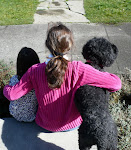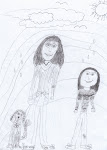
It's interesting timing given my focus in recent weeks and my post from this afternoon, (I wish I could claim to be clairvoyant but that would be pushing it) but there's very interesting news, just out today, for the entire adoption community.
The Evan B. Donaldson Adoption Institute just released a new, ground-breaking study entitled, "Beyond Culture Camp: Promoting Healthy Identity in Adoption." According to the authors, the study offers the most extensive look to-date at identity development in adoptees. It incorporates decades of research while also drawing on extensive interviews with "White" as well as transracial (primarily Korean American) adult adoptees. The study explores and identifies experiences and strategies that promote positive identity development in adoptees.
Here are highlights or the "central findings," as cited in the study's Executive Summary:
(1) Adoption is an increasingly significant aspect of identity for adopted people as they age, and remains so even when they are adults.
(2) Race/ethnicity is an increasingly significant aspect of identity for those adopted across color and culture.
(3) Coping with discrimination is an important aspect of coming to terms with racial/ethnic identity for adoptees of color.
(4) Discrimination based on adoption is a reality, but more so for White adoptees – who also report being somewhat less comfortable with their adoptive identity as adults than do their Korean counterparts.
(5) Most transracial adoptees considered themselves White or wanted to be White as children.
(6) Positive racial/ethnic identity development is most effectively facilitated by “lived” experiences, such as travel to a native country, attending racially diverse schools, and having role models of their own race/ethnicity.
(7) Contact with birth relatives, according to the White respondents, is the most helpful factor in achieving a positive adoptive identity.
(8) Different factors predict comfort with adoptive and racial/ethnic identity for
Korean and White adoptees.
The findings and publication of this study is very good news for our community -- assuming it helps foster further discussion and thinking as to how we, as parents, can best help our children develop a stronger, more positive sense of themselves.
I don't know about you, but I need all the help I can get.






No comments:
Post a Comment